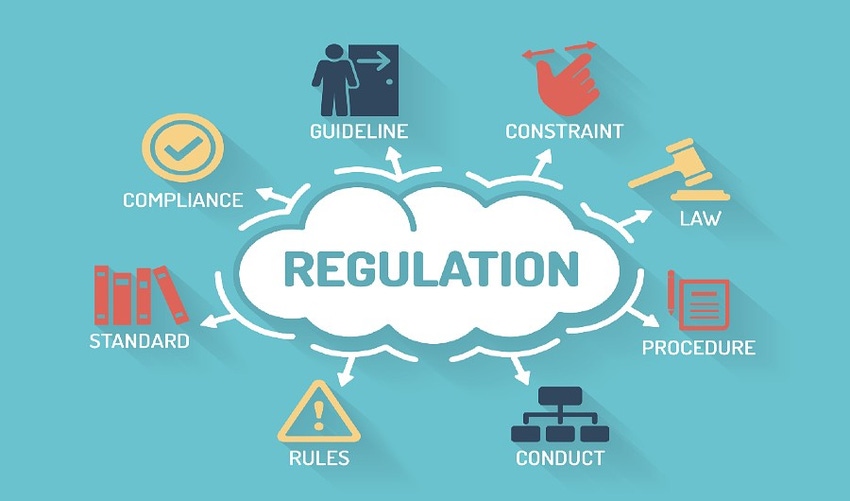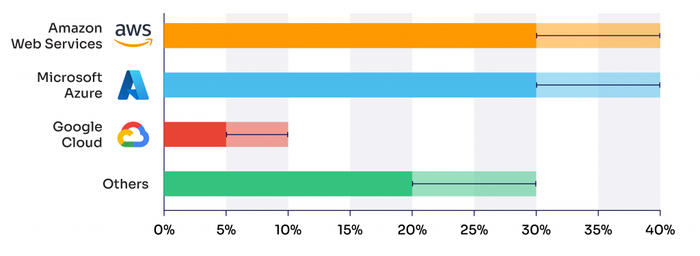Regulator Singles Out AWS, Microsoft as Stifling Competition in UK Cloud Market
In a blistering attack, CISPE accused Microsoft of continuing to "distort fair competition in the cloud."

U.K. communications regulator Ofcom will refer cloud giants Amazon Web Services (AWS) and Microsoft to the Competition and Markets Authority (CMA) for further investigation.
Ofcom launched a study last year into the UK’s £15 billion ($16.9 billion) cloud sector. It is examining whether the big cloud players are stifling competition in the market. In particular, it is investigating if hyperscalers are “making it difficult for other cloud providers to enter the market or smaller companies to expand.”
Now halfway through its research, Ofcom said it has “identified features and practices that make it more difficult for customers to switch and use multiple cloud suppliers.”

Courtesy: Ofcom
It has singled out the practices of AWS and Microsoft, due to their market dominance. Between them, they have a combined market share of 60-70% in the U.K. Google is their closest competitor, with a share of between 5% and 10%.
Fergal Farragher, Ofcom’s director responsible for the market study, said the regulator has “uncovered some concerning practices, including by some of the biggest tech firms in the world.”
“High barriers to switching are already harming competition in what is a fast-growing market,” he said. “We think more in-depth scrutiny is needed, to make sure it’s working well for people and businesses who rely on these services.”
3 Ways Hyperscalers Are Blocking Competition
Ofcom has highlighted three areas of concern:
Egress fees: Ofcom found the hyperscalers set these charges at significantly higher rates than other providers. The cost of egress fees can discourage customers from using services from more than one cloud provider or switch to an alternative provider.
Technical restrictions on interoperability: Imposed by the leading firms, the regulator said these prevent some of their services working effectively with services from other providers. This means customers need to put additional effort into reconfiguring their data and applications to work across different clouds.
Committed spend discounts: The regulator noted these can benefit customers by reducing their costs; however, it found that the way the discounts are structured can incentivise customers to use a single hyperscaler for all or most of their cloud needs, “even when better quality alternatives are available.”
Said Ofcom: “These market features can make it difficult for some existing customers to bargain for a good deal with their provider. There are indications this is already causing harm, with evidence of cloud customers facing significant price increases when they come to renew their contracts.”
In addition, some customers are concerned about their ability to switch and use multiple providers where this limits their ability to mix and match the best quality services across different providers.
“High levels of profitability for the market leader, AWS, and substantial consistent growth in Microsoft’s profits, indicate there are limits to the overall level of competition,” said Ofcom.
“We are concerned that constraints on customers’ ability to use more than one provider could make it harder for smaller cloud providers to win business and compete with the market leaders. Revenues are already concentrated with a few players, and there is a risk [this] could lead the market to concentrate further towards the market leaders.”
Microsoft’s ‘Unfair Software Licensing Practices Distort Competition’
In response, AWS said it will continue to work with Ofcom ahead of the publication of its final report.
“The U.K. has a thriving and diverse IT industry with customers able to choose between a wide variety of IT providers,” stated an AWS spokesperson. “At AWS, we design our cloud services to give customers the freedom to build the solution that is right for them, with the technology of their choice. This has driven increased competition across a range of sectors in the U.K. economy by broadening access to innovative, highly secure and scalable IT services.”
However, Francisco Mingorance, secretary general at Cloud Services Providers in Europe (CISPE) launched a blistering attack on Microsoft. He called for …
… “open formal investigations into Microsoft’s unfair software licencing practices as an urgent competition issue.”

CISPE’s Francisco Mingorance
He said: “It is clear that Ofcom recognises the potential for Microsoft’s unfair software licensing practices to distort competition in the cloud market. It devoted a whole chapter of its interim report to these practices. More and more customers, competitors and regulators are waking up to the ways in which Microsoft continues to distort fair competition in the cloud. Private deals are unlikely to solve these sector-wide issues. Based on the mounting evidence, it is important that both national and EU authorities open formal investigations into Microsoft’s unfair software licencing practices as an urgent competition issue.”
CMA to Consider Intervention
The CMA, a government organization, will now carry out a market investigation. This would allow it to examine the nature and extent of barriers and decide if “interventions” could improve how the market works for customers.
“Making a market investigation reference would be a significant step for Ofcom to take. Our proposal reflects the importance of cloud computing to U.K. consumers and businesses [and] the significant concerns we have about the cloud infrastructure market.”
Ofcom said the CMA is “best placed to undertake any further investigation. We will continue to engage closely with the CMA during the second half of the study.”
Ofcom is inviting feedback on its interim findings, and its proposal to refer the cloud market will go to the CMA by May 17, 2023. It plans to publish a final report setting out its findings and recommendations by no later than October 5, 2023.
Want to contact the author directly about this story? Have ideas for a follow-up article? Email Christine Horton or connect with her on LinkedIn. |
Read more about:
MSPsAbout the Author(s)
You May Also Like


